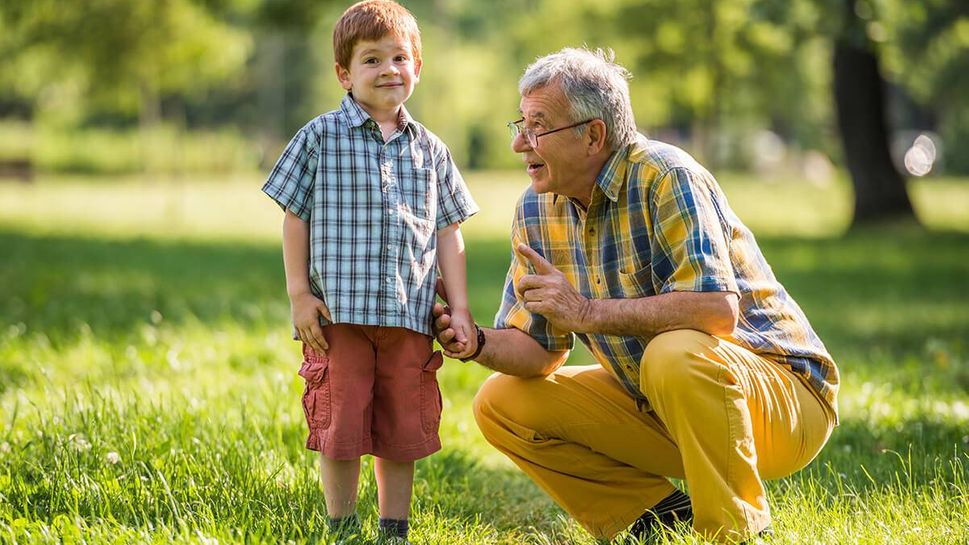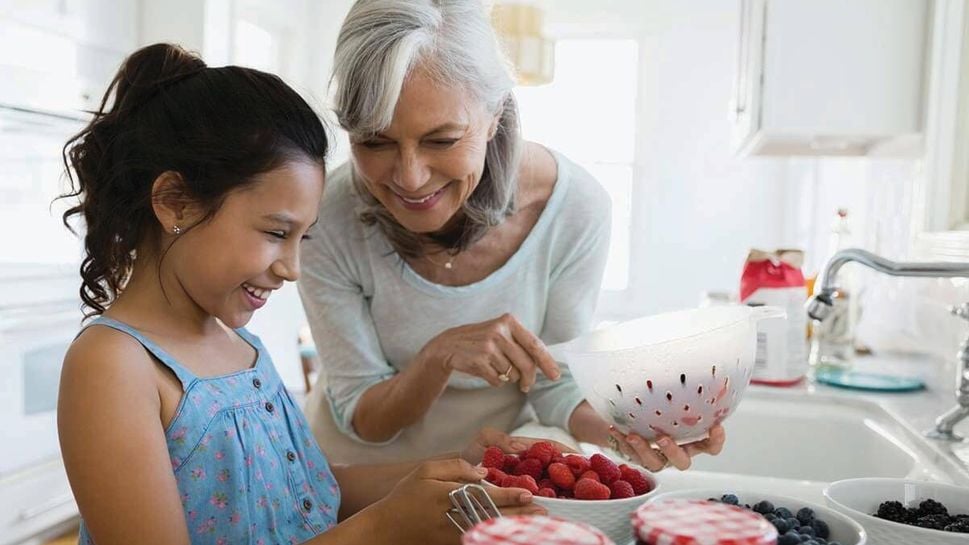Quiz: Are You a Helicopter Grandparent?
Answer these five questions to learn whether you're too hands on
1 of 7

It’s not just that I don’t like to think of children as poultry or myself as a chicken farmer. But there is no way I could have raised my kids “free range.” The New York City block where they grew up is relatively quiet — compared to Times Square. A child running out to the street to chase a stray ball could easily be hit by a car.
I also could not encourage my young children to explore the neighborhood on their own. Sure, the busy intersection to the closest playground has stoplights. My son and daughter knew by the time they were 2 that the red hand means “don’t cross.” All this genius (insert smiley face), however, had no power over automobiles and trucks that jump the light. Dangerous stuff — and I haven’t even made it to what might have happened if they entered the park unchaperoned.
If this sounds like I was a “helicopter parent,” let me assure you that although I was a diligent attendee at teacher-parent conferences, I never called my children’s teachers to second-guess their decisions. (Except for that one time I went psycho on the 11-grade American history teacher when my daughter didn’t get the AP History class she wanted.)
Now that I’m a grandma, I frequently have a minor “out-of-body” experience after I have done something “helicopter-ish” (like insist to my 20-month-old grandson that he wear shoes on a gravel driveway). Am I hovering too much? Am I damaging his independence? Is feeling extra-cautious part of the grandparent territory because as parents we saw the bad stuff that accompanied neglect?
I had so many questions that I decided to create a helicopter grandparent quiz using real-life scenarios to figure it out.
Want to know if you’re a “helicopter grandparent?" Take our five-question quiz by clicking the photo above to see the next slide.
Scenario No. 1:
The day care center or nursery school your granddaughter attends has a phone app to help parents keep track of their kids’ daily routines. Your adult child has given you access to the app. You notice that for several days running, your granddaughter hasn’t been eating her lunch. Choose your number below (you'll add up all the numbers at the end of the quiz):
- You wonder if perhaps your granddaughter isn’t feeling well, but you have confidence her parents will be told by the facility’s staff about any issues.
- You call your son/daughter/son-in-law/daughter-in-law because you’re worried that your granddaughter may be ill and you expect they’ll fill you in.
- You use the section in the app where you can contact the teachers directly to inquire if your granddaughter is sick.
Keep track of your answer, and click the right arrow above to read the next scenario.
Scenario No. 2:
Your toddler grandson starts to run down a path that you know suddenly ends in two stone steps that lead to the street.
- You don’t worry because falling is something kids do when they’re developing their large motor skills.
- You wait to see if either of his parents will catch him and if neither goes after him, you dash down the path to scoop him up before he gets to the potentially dangerous steps.
- You hover beside the child all the way because you’re afraid he’ll trip and fall, and you tell his parents they’re not paying enough attention.
Keep track of your answer, and click the right arrow above to read the next scenario.
Scenario No. 3:
While sitting beside you at the computer, your 9-year-old granddaughter opens up a class-project Google doc and finds that all her work has been erased and her classmates have typed in “you’re a weirdo.”
- You ignore what’s on the computer screen and suggest that your granddaughter do something else because you feel what happens at school is her parents' responsibility, not yours.
- If you have the skills, you show her how to recover her work on a Google doc. You also ask if she wants to talk about how kids can be mean. Later, you tell her parents what happened.
- You call the teacher, the principal and the parents of all the classmates to insist they do something about this glaring instance of bullying.
Keep track of your answer, and click the right arrow above to read the next scenario.
Scenario No. 4:
Seeing your 12-year-old granddaughter exiting the community pool, you notice that she is “developing” and that other people (kids and adults) are looking at her protruding nipples.
- You don’t say anything because talking about puberty is her parents' responsibility, not yours.
- You call her parents and report what you’ve seen, including your concerns that she was attracting attention.
- You wrap her up in a towel and immediately drive to a store where you purchase her first bra.
Keep track of your answer, and click the right arrow above to read the next scenario.
Scenario No. 5:
Your grandson is at the end of his junior year of high school and says he wants to go to college when he graduates.
- You say “how nice” and talk about what he’s heard about various schools.
- You call your grandson’s parents and offer to help out in any way you can — for instance, by taking him on college visits — because you have more time than they do.
- You immediately go online and check out every college your grandson has mentioned and make sure to read over all his applications and provide advice about his essays.
Now, add up all of your numbers and click the right arrow above to advance to the next slide to learn your grandparenting style.

Here's Your Helicopter Grandparent Answer
If you scored 5 to 8 points...
Your grandparenting style is “hands-off” — perhaps too much so. “Grandparents sometimes have to walk on eggshells and be mindful and careful that your adult child will not see you as judging their parenting. Ideally, grandparents can play an active role that matches the parameters they’ve worked out with their adult children,” says Richard C. Horowitz, a family coach from Palm Harbor, Fla., who specializes in boomers.
If you scored 8 to 10 points...
According to Holly H. Schiffrin, a psychology professor at University of Mary Washington in Fredericksburg, Va., who publishes research on “helicopter parenting,” people who find the second response closest to their own have probably worked out a good middle ground between “helicoptering” and too much distance. “Your long -term goal is to provide guidance while you help your grandchildren develop skills for themselves. At the same time, you need to let your adult children know you respect their parenting decisions,” she says.
If you scored 10 to 15 points...
Both Horowitz and Schiffrin believe that the third response for each scenario can be classified as helicoptering. “If for some reason the child’s parents can’t be reached and you are the primary caregiver, then, yes, go ahead and call the school and take whatever action you need to keep the child safe,” Horowitz advises. Otherwise, the guiding response to any issue should come from your grandchildren’s parents. Yes, your input is valuable. Still, grandparents need to take care that they don’t undermine their own children — in the best interests of their relationship to their grandchildren and to their own adult kids as well. In Schiffrin’s words, “You need to trust as a parent that you’ve raised your children to be competent parents themselves.”

